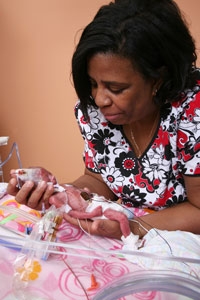Small Baby Unit
 The Small Baby Unit (SBU) is located within the Neonatal Intensive Care Unit (NICU) at OSF HealthCare Children’s Hospital of Illinois. The SBU provides a family-centered, specialized, therapeutic environment specifically for babies born before 30 weeks gestation, delivering a combination of medical care and developmental support to improve neurodevelopmental outcomes.
The Small Baby Unit (SBU) is located within the Neonatal Intensive Care Unit (NICU) at OSF HealthCare Children’s Hospital of Illinois. The SBU provides a family-centered, specialized, therapeutic environment specifically for babies born before 30 weeks gestation, delivering a combination of medical care and developmental support to improve neurodevelopmental outcomes.
Each room is darkened with noise levels kept to a minimum to create an environment similar to that of a mother’s womb. This helps promote natural brain development. The unit performs cue-based care, which means care is provided based on each baby’s individual signals and needs instead of the focus being set by a routine, predetermined schedule. Medical needs are always a top priority, but the SBU also allows the baby to have uninterrupted rest, promoting optimal brain development.
The SBU uses a team approach to care for each infant. The team includes physical therapists, speech therapists, respiratory therapists, dieticians, doctors, nurse practitioners and nurses, who are all trained to provide specialized care for premature infants. The team meets each morning with the parents to discuss the baby’s health, creates a plan for the next 24 hours and determines long-term goals for the infant.
With each patient interaction, there are two medical staff involved. One person completes the needed care while the other person provides appropriate neurodevelopmental containment and comfort for the baby.
The SBU encourages parents to become integral members of the caregiving team by being at their baby’s bedside as often as possible, participating in daily rounds, seeking their input on several aspects of their baby’s care, and helping facilitate skin-to-skin (kangaroo) care.
Empowering families to participate in their babies’ care increases the bonding between the babies and caregivers. It also gives parents the confidence and understanding to care for their babies on their own, which reduces readmission rates substantially and makes a positive difference in developmental outcomes.
